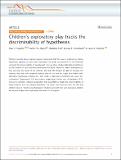Children’s exploratory play tracks the discriminability of hypotheses
Author(s)
Siegel, Max H; Magid, Rachel W; Pelz, Madeline; Tenenbaum, Joshua B; Schulz, Laura E
DownloadPublished version (1.720Mb)
Publisher with Creative Commons License
Publisher with Creative Commons License
Creative Commons Attribution
Terms of use
Metadata
Show full item recordAbstract
Effective curiosity-driven learning requires recognizing that the value of evidence for testing hypotheses depends on what other hypotheses are under consideration. Do we intuitively represent the discriminability of hypotheses? Here we show children alternative hypotheses for the contents of a box and then shake the box (or allow children to shake it themselves) so they can hear the sound of the contents. We find that children are able to compare the evidence they hear with imagined evidence they do not hear but might have heard under alternative hypotheses. Children (N = 160; mean: 5 years and 4 months) prefer easier discriminations (Experiments 1-3) and explore longer given harder ones (Experiments 4-7). Across 16 contrasts, children’s exploration time quantitatively tracks the discriminability of heard evidence from an unheard alternative. The results are consistent with the idea that children have an “intuitive psychophysics”: children represent their own perceptual abilities and explore longer when hypotheses are harder to distinguish.
Date issued
2021Department
Center for Brains, Minds, and Machines; Massachusetts Institute of Technology. Department of Brain and Cognitive SciencesJournal
Nature Communications
Publisher
Springer Science and Business Media LLC
Citation
Siegel, Max H, Magid, Rachel W, Pelz, Madeline, Tenenbaum, Joshua B and Schulz, Laura E. 2021. "Children’s exploratory play tracks the discriminability of hypotheses." Nature Communications, 12 (1).
Version: Final published version